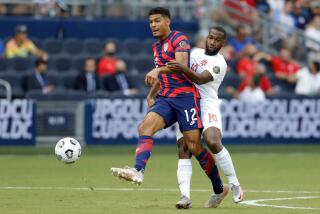Brazilians Will Play Under the Overage Rules
- Share via
The Olympic gold medal is the one honor that so far has eluded Brazil in the country’s otherwise glittering soccer history. The Brazilians came close in the 1996 Atlanta Games, but were upset by eventual champion Nigeria in the semifinals.
Brazil won the bronze, but its players were so unhappy at a third-place finish that they initially declined to accept the medals.
This time around, Coach Wanderley Luxemburgo has taken an unexpected tack: On Thursday, he decided to send a team to Sydney that does not include any “overage” players.
Olympic soccer competition is limited to players 23 and younger, but three older players are allowed per team.
Less than a month ago, Brazil’s once-brightest star was nearly begging to be one of the older players going to Australia.
“The Olympic Games never leave my mind,” said Romario, who was the world player of the year in 1994 when he led Brazil to its World Cup triumph in the United States.
Romario, 34, wanted desperately to play in Sydney.
“It’s my dream, it spurs me on to train 10 hours a day to regain my form,” said the forward who has scored 52 goals in 71 games for Brazil.
Luxemburgo was unimpressed.
“We decided to take this group independent of what Romario wants,” he said.
That decision will not sit well with Juan Antonio Samaranch, the International Olympic Committee president, but it will cause Joseph “Sepp” Blatter to smile.
The issue of overage players has long been a bone of contention between Samaranch and Blatter, his counterpart at FIFA.
Samaranch wants to see the soccer tournament in the Summer Games open to all players, regardless of age. Blatter, like his predecessor, Joao Havelange, would rather see the Olympics as an entirely Under-23 event, filling in logically above the FIFA Under-17 and Under-20 world championships but below the World Cup.
The limit to three overage players is an unsteady compromise.
AGE RINGS
Luxemburgo’s decision won’t leave the Brazilian team with a squad of unknowns. In fact, considering the players he has selected, Brazil very well could win the gold.
The coach can look, for instance, to 20-year-old forward Ronaldinho Gaucho, who helped Brazil win the Copa America in 1999 and who already has been the target of a $27-million offer from Real Madrid in Spain.
Ronaldinho’s Brazilian club, Gremio, declined it, and the player is in no rush to make a move. After all, he reportedly already earns $28,105 a month.
Then there is Flamengo left back Athirson, only 23 but already signed to play for Juventus in Italy next season. Athirson is so talented that he is being touted as the likely heir to Brazil World Cup star Roberto Carlos. The one--but apparently not serious--blot on his resume is that he was suspended for a month this year when a postgame drug test revealed traces of a stimulant usually found in weight-control medication.
All 18 players on the Brazilian roster still play for clubs in Brazil, which is perhaps why Luxemburgo left another top-flight prospect off his team.
Had he chosen to do so, he could have called on midfielder Adriano, 22, who last month signed a four-year contract to play for Olympique Marseille in France after being acquired for $3.57 million from little-known Atletico Paranaense in Brazil.
The array of talent emerging from Brazil is as ceaseless as ever.
THE SOUND OF SALAS
Romario is not the only top-flight striker wanting to go to Australia. On Wednesday, forward Marcelo Salas said he was considering making himself available for Chile’s yet-to-named Olympic team.
Salas plays for Lazio of Rome, the defending Italian league champion. Normally, Italian clubs would not think much of star players wandering off to the far side of the globe just when the new season is approaching.
But Italy qualified for the Sydney Games when it won the European Under-21 championship this year and the Italian league has thoughtfully delayed the start of its 2000-01 season until Oct. 1, after the Olympics.
Salas, 25, is in top form at the moment, having scored one goal and created two others as Chile beat Brazil, 3-0, on Wednesday in a World Cup 2002 qualifying game at Santiago, Chile.
That shockingly comprehensive defeat, Brazil’s second in qualifying play, has provoked an outcry among fans and might well prevent Luxemburgo from going to the Summer Games.
Even more bizarre, his solution to Brazil’s goal-scoring crisis has been to call on a veteran--none other than Romario--for the crucial next match, which clashes with the Olympics.
So Luxemburgo has a choice: go to Sydney without Romario or stay in Rio de Janeiro with him.
SPAIN FOLLOWS SUIT
Spain, which won the gold medal at the Barcelona Olympics in 1992, has followed Brazil’s lead and will not take any overage players to Australia.
The preliminary squad of 23--to be cut to 18 this week--includes 21 players from the Spanish league and two from the Italian league.
The best-known among them is 20-year-old midfielder Gerard, who scored a hat trick for Valencia against Italian champion Lazio in European Champions League play last season and who subsequently was reacquired by his former club, Barcelona, for $20.35 million.
Gerard, Major League Soccer’s minimum-wage Olympians will note, earns $2.26 million a year after tax.
MEANWHILE, IN NIGERIA
Defending Olympic champion Nigeria has been beset by club-versus-country conflicts, with many of its star players, prompted by their clubs, declining to join the Olympic team.
So far, Coach Jo Bonfrere has received “sorry, but no thanks” replies from two 1996 gold medalists: national team captain Sunday Oliseh of Borussia Dortmund in Germany and midfielder Austin “Jay-Jay” Okocha of Paris Saint Germain in France. In England, Arsenal is balking at releasing another gold medalist, forward Nwankwo Kanu.
BRUIN CONNECTION
Trust Galaxy Coach Sigi Schmid to see a little Westwood everywhere. The former UCLA coach points out that the selection of Peter Vagenas and Frankie Hejduk to the U.S. team keeps a 12-year streak intact.
“I think it speaks well for the UCLA program, past and present, that since 1988 there have always been at least two Bruins on every Olympic team,” Schmid said. “I don’t think any other university can say that. It’s something to be very proud of.”
More to Read
Go beyond the scoreboard
Get the latest on L.A.'s teams in the daily Sports Report newsletter.
You may occasionally receive promotional content from the Los Angeles Times.






